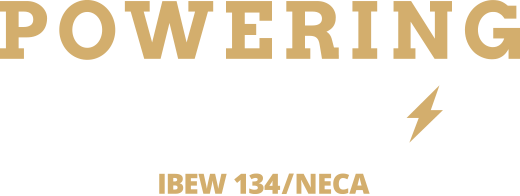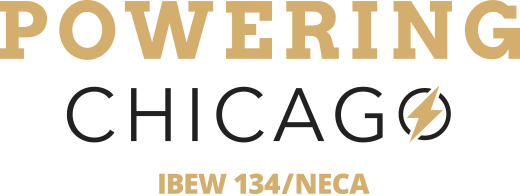An Abridged History of Black Membership in IBEW Local 134
- Posted: February 22, 2021
- Apprenticeship Program, better careers, IBEW Local 134, IBEW-NECA Technical Institute, Taylor Electric, YouTube video
In his thesis while attending the National Labor College, now retired IBEW Local 134 Vice President Russell Ponder wrote about Michael Boyle, one of Local 134’s legendary members. In doing research to write the paper, Ponder documented several watershed decisions in the union that opened doors for Black members in the 100+ years since the first Black member was admitted. As we recognize Black History Month this February, it’s a story worth sharing.
According to Ponder’s research, IBEW Local 134 Business Manager Michael Boyle did something radical in 1919. With his admission of Sam Taylor into the union, the color barrier had been broken a full decade before Martin Luther King, Jr. was even born and the better part of half a century before the federal Civil Rights Act was passed in 1964. Though Boyle was an often controversial labor leader who dominated Local 134 from 1919-1958, his power and influence allowed him to do what few others were willing to do themselves.
Despite Taylor’s knowledge of electrical work, no one would hire him because of his race. To support his family, he had opened his own electrical service shop in 1918 on the south side of Chicago, where he endured abuse by white employers, hazardous working conditions, long hours, and little-to-no pay. By 1922, he had founded Taylor Electric, the first Black-owned construction company in Chicago, which continues to thrive today with the third and fourth generations of the family running the business.
As Ponder documented it, Local 134’s pattern of inclusivity didn’t end with Sam Taylor. In 1943, Boyle became aware of the Patterson Club — a state-chartered electrical union composed entirely of Black electricians. After granting them probationary membership into Local 134, the group satisfied all requirements and became full-fledged members. From this group, Boyle appointed Herman Washington, a recent Tuskegee University graduate, as a business representative assigned to the South Side of Chicago. With his appointment, Washington became the first Black business representative not just in IBEW Local 134, but in all of the building trades in Cook County. Following in Washington’s footsteps was Jim Moore, Local 134’s second Black business representative, who served in the role from 1967 to 1987.
It’s at this point where history begins to merge into the present. Russell Ponder didn’t start out with aspirations of following in the footsteps of Taylor, Washington, Moore, and the other Black members who paved the way before him, but that’s precisely what he ended up doing. After receiving a college scholarship in Nebraska to play football and basketball, Ponder returned home to Chicago after a year and was drafted into the Army in 1965 during the Vietnam War. After spending his military career in Germany as a communication specialist, Ponder came back to Chicago after being discharged and got a job at the post office.
With President Lyndon Johnson’s administration appropriating significant funding for vocational training, the Urban League in Chicago was helping prepare young people of color to pass the necessary exams for acceptance into trade apprenticeship. Interested in a career in the trades, Ponder signed up for the program, completed an assessment, and ultimately added his name to the waitlist for an electrical apprenticeship. Two years later, in 1972, he was accepted into the program and began a career in the trade that started with experiences working on projects like The First National Bank and Northern Trust downtown, the Mars Candy and General Mills factories, among others.
As Ponder progressed in his career, he became more involved with Local 134 and eventually became the first Black instructor at the apprenticeship school. It was the first ‘first’ in a career filled with them. In 1980, Ponder was appointed to fill a vacancy on Local 134’s examining board, becoming the first Black member of the body that is tasked with determining the qualifications of electricians seeking membership in the union. By 1987, Ponder was the logical choice to become Local 134’s third Black business representative after the second, Jim Moore, retired, carrying on the legacy of Herman Washington. When he was later elected to the role of Vice President in 2004, he became the first person of color to ever hold a board position. By the time Ponder retired in 2010, his career had opened doors for others just like those who had come before him had done for his generation.
One of the current members of IBEW Local 134 who has benefitted from the contributions of members like Ponder is Maurice King, who continues to advance their legacy. King, the Vice President of Local 134 and Director of Community Relations, began his career in RAT (training class) 134 in 1985. After getting experience in the field working at places like O’Hare Airport and Navy Pier (where he helped build the original ferris wheel), King began teaching at the IBEW/NECA Technical Institute after being recommended for the position by none other than Russell Ponder.
In his current capacity as the Director of Community Relations, King leads Cook County’s unionized electrical industry’s outreach efforts to recruit minority candidates for the apprenticeship program. Among his accomplishments is the creation of the Jump Start program, which offers 24 hours of intensive classroom instruction that introduces individuals to the electrical construction industry and prepares them to take the apprenticeship exam. Enrolling anyone who is interested, Jump Start has opened the door to apprenticeship for approximately 1,000 young people from communities across Chicago since it was founded 17 years ago.
To ensure that minority students and members of the community know about the potential that exists for them in the industry, King belongs to more than 10 boards, attends hundreds of community events each year, including church-sponsored events, adult-based job readiness programs and career fairs, and is closely involved with programs like Chicago Builds, a partnership with Chicago Public Schools to introduce students to better careers in the unionized electrical industry.
As Powering Chicago Director Elbert Walters III wrote in the Sun-Times last year, “We will continue our work to increase opportunities for minorities and underserved populations in our industry. It remains one of our top priorities, as it should be for all unionized trades. We know that doing so will further strengthen the electrical industry and provide a better construction environment, better career opportunities, and better communities to live in throughout the Chicagoland area.”
With a legacy that includes members like Sam Taylor, Herman Washington, Jim Moore, Russell Ponder, Maurice King, and countless other Black members who have led the way, we have quite a history to build on in pursuit of that goal.
Be sure to watch the embedded videos with interviews with Russell Ponder and Maurice King, and visit the Powering Chicago YouTube channel for additional Black History Month content.

